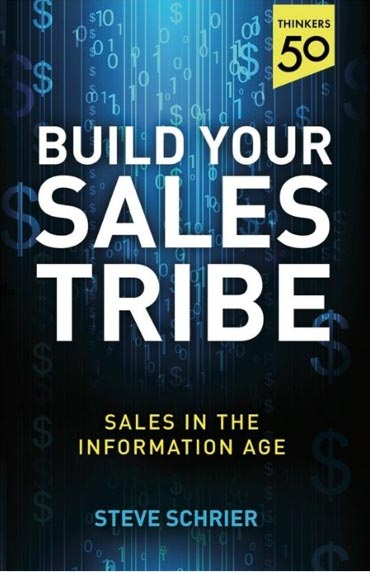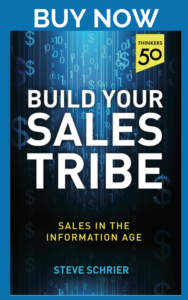
This post is a companion post to the Build Your Sales Tribe Book article on video interviewing software. If you own the book, thanks for visiting. If you don’t own the book, find out more here: www.salestribe.co.uk
Internet based automatic (one-way) video interviewing can save you a lot of time and energy in sifting through candidates. The principal is that, instead of wading through piles of CVs / Resumes / LinkedIn pages etc., you can divert prospective candidates to a piece of software. Here they all answer the same set of questions on camera for you to view at your leisure.
You are able to set things such as time limits to answer a question and to suit your time frame. This in turn will allow you to determine how much time up-front you or others will invest at this stage of the process.
You can usually set the maximum number of attempts. Equally you can set the ‘takes’ the candidate is able to have at answering the questions. Allowing more than 3 could mean that you are watching a fairly polished presentation. (The software should also tell you which attempt you are watching).
How long should you spend on an interview
You should also be able to determine how long an interviewee is given to think until they answer the question. Of course, you could choose to just send the questions in advance. That would mean you don’t have a clear comparison between each candidate. Although for some questions you could consider sending some pre-reading material – see below. Usually for sales people, it makes sense for questions to be presented in real-time. They are then required to answer them, with a short 10-20 second thinking time.
You can delegate the watching of the videos to other members (or all) of the team to achieve a consensus on which candidates the organisation takes forward. This can also save you time before moving forward and investing further in a candidate.
Finding the right people is of course critical for many roles. As we discuss in the book, for sales people we are looking for a certain set of criteria. These can immediately be uncovered from this type of up front interview before engaging with any candidate.
Automated (one way) Video Interviewing
Automated (one-way) video interview software suits this perfectly because:
- Most sales people will need to be comfortable under this sort of scrutiny. As we discuss in the Build Your Sales Tribe book, pressure is something sales people need to be able to handle.
- It is pretty tough without two-way communication, which any modern sales person will usually need to try to establish. However it is a reality that some sales communications methods (email, etc) will not deliver real-time feedback.
- This approach allows you to initially visually test the more subtler things a sales person will need to bring to the table. For example mannerisms, ability to present, articulation, elements of personality, etc. All these bring more than any written piece or voice communications can deliver.
- Critically, this allows elimination of unsuitable candidates without further time investment – good for you and them.
- It checks the sales person’s ability to ‘listen’ to questions and answer them. This is probably one of the most important tests for any sales person. Make sure you, and anyone reviewing the answers, looks specifically at how closely the answer suits the question that is asked.
- It creates a fair and level environment since every interviewee will go through the same interview – make sure internal candidates are no different.
- Time zones are no longer an issue.
Valuable tips on setting the questions:
- Make sure the questions are not too rigid or ‘closed’. They need to allow the sales person some time to deliver an answer that is theirs. For example, ‘introduce yourself in less than a minute’, will test many things but mainly help you to test their focus on business elements, professionalism. If they have some idea of an ‘elevator pitch’, which are all tools in modern selling. Do they waffle here? What is their confidence like – quiet confidence or brash ‘you need me more than I need you’ type?
- Make sure they introduce some data that the sales person needs to recall. For example, read/display a passage they should read and then test some recall to it. Perhaps, the best one here is simply to ask them something about your website – recent news etc. Anyone who hasn’t read your website probably shouldn’t be applying for a job with you.
- Ask about their perception of ’value-add’ and achievement – simply ‘describe a situation where you have made a difference’ or similar. Are there any numbers in their answer? (Good sales people will generally use numbers in their vocabulary.) Do they describe a tricky negotiation in which they succeeded? Even if they just tell you about when they were added to the tug-of-war team, that is still a sign of some team work. The answers can vary greatly here.
- ‘What is something you can tell us about which you are proud to have achieve which suits this job description?“. There has to be something about a deal they have done, a contract renewal they achieved or a commercial situation that has gone well for them. Find out why it made them proud. If they are not currently a sales person, describing another kind of success in a way that demonstrates ownership. Establish how they executed an issue, this is what we are looking for here.
- Consider also asking about a ‘favourite failure’ and what was learned from it – since this can show a lot about the commercial mindset of a person. ‘I lost the deal but I got the customer to buy from me eventually’ can make good a story.
- Test their attitude to money as early as possible. A top question here is ‘If I gave you 100,000, what would you do with it?’ There is obviously no ‘right’ answer but what they answer may tell you about their attitude to money. Sales people who are ‘hunters’ for new business are generally interested in money, and will typically spend every penny they get. Account managers or more ‘farmer’ or ‘nurturing’ types will typically save some or all of it.
- References. If I asked 5 of your customers or colleagues what they would say about you, what would it be?
- Put any internal candidates through the same test.
- ‘If you move ahead in this process, what question would you most like answered by our CEO?’ Again, this will tell you a lot about where a candidates head is with the job. If the answer is a generic ‘Where will the company be in 5 years time?’, you can pretty much tell they have done no homework. The best answers here are ones that relate directly the to the job the candidate is being interviewed for or that show ambition.
- Concise storytelling in all answers is another trait we need to find in our interviews. Someone who has done things and isn’t afraid to tell those stories to demonstrate the value they can add to the business. They needn’t be even directly business related!
This list may look like we are looking for a unicorn but you will know when you find them. It will have saved hours in phone and face-to-face dead-end interviews which is good for everyone.
Some automated Video Software tools
- https://www.myinterview.com – (free up to 30 candidates)
- https://easyhire.me/ – (free for one job and 5 interviews a month)
- https://www.jobma.com/employer ($119 set-up and $1 per interview)
There are lots of others, some have them built into their wider recruitment systems (beyond the scope of this post). But this is the sort of software where you can trial it risk free to see if it works for you before scaling. There is no reason why it should cost too much – certainly when compared to manually sifting through this.
Books To Read on Interviewing Techniques:






